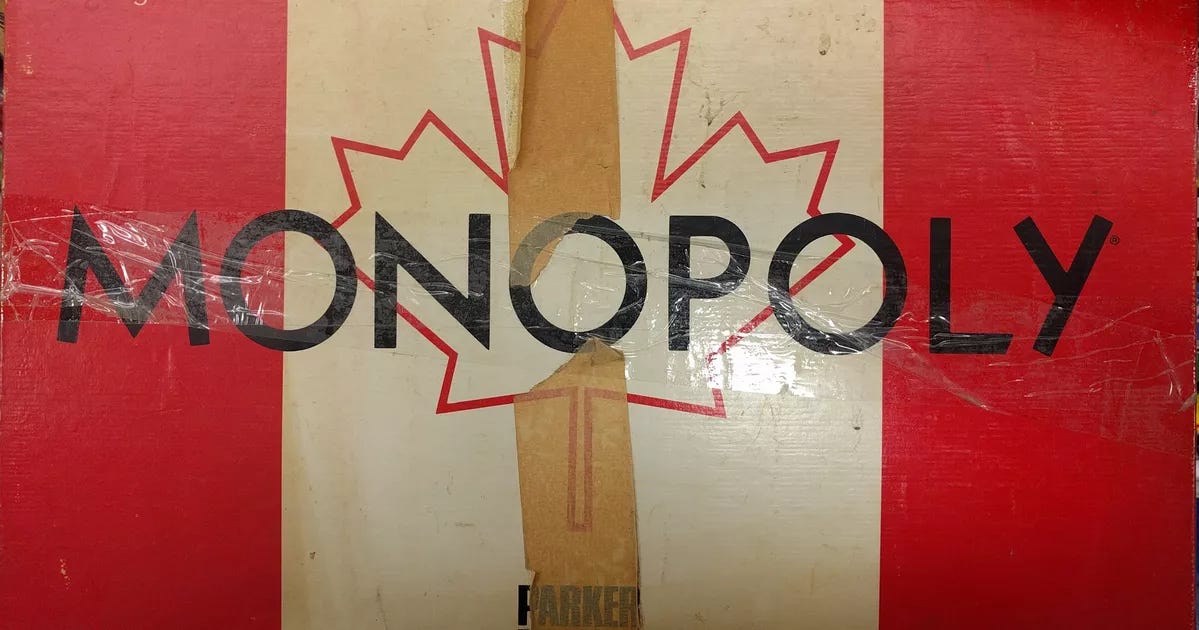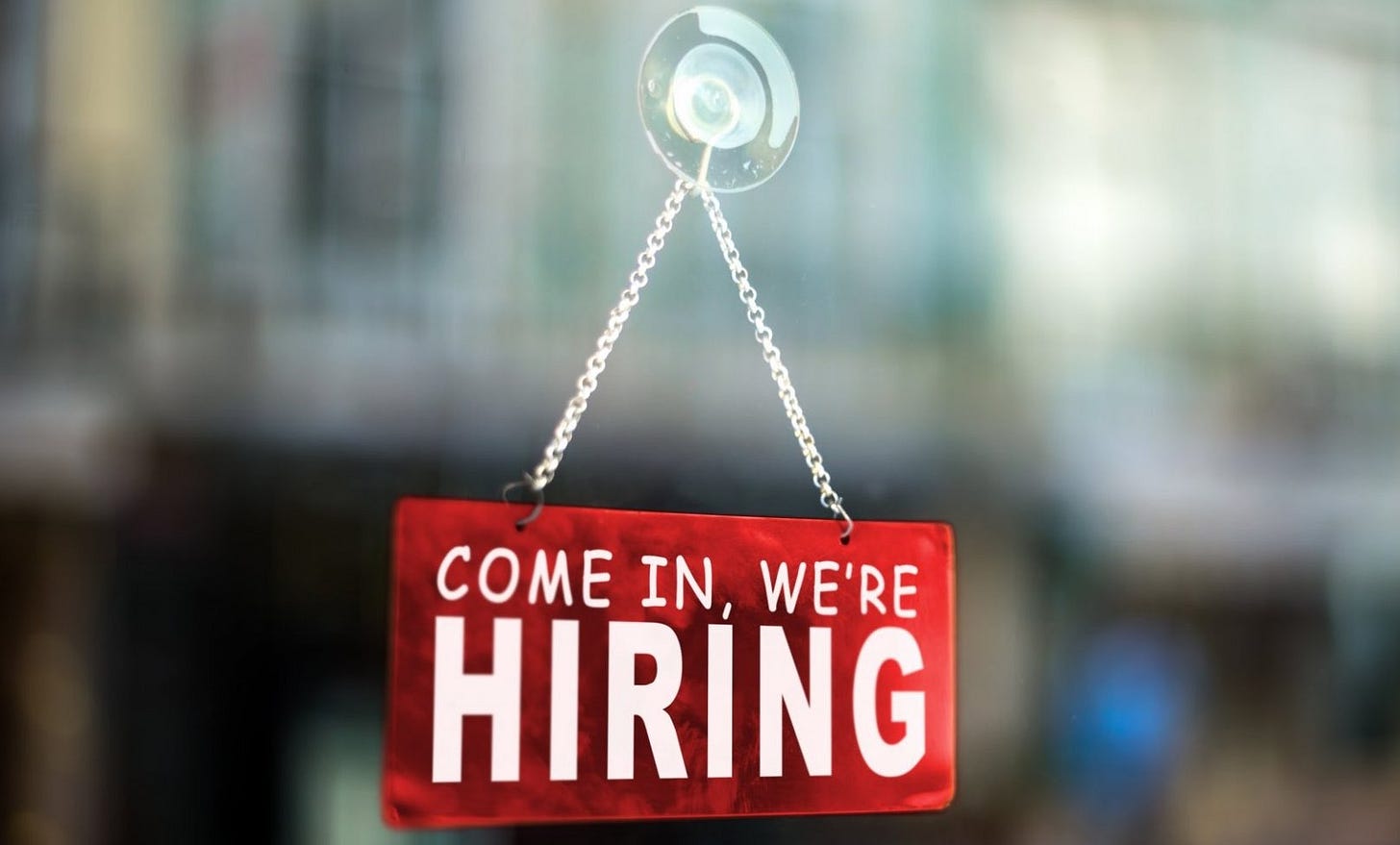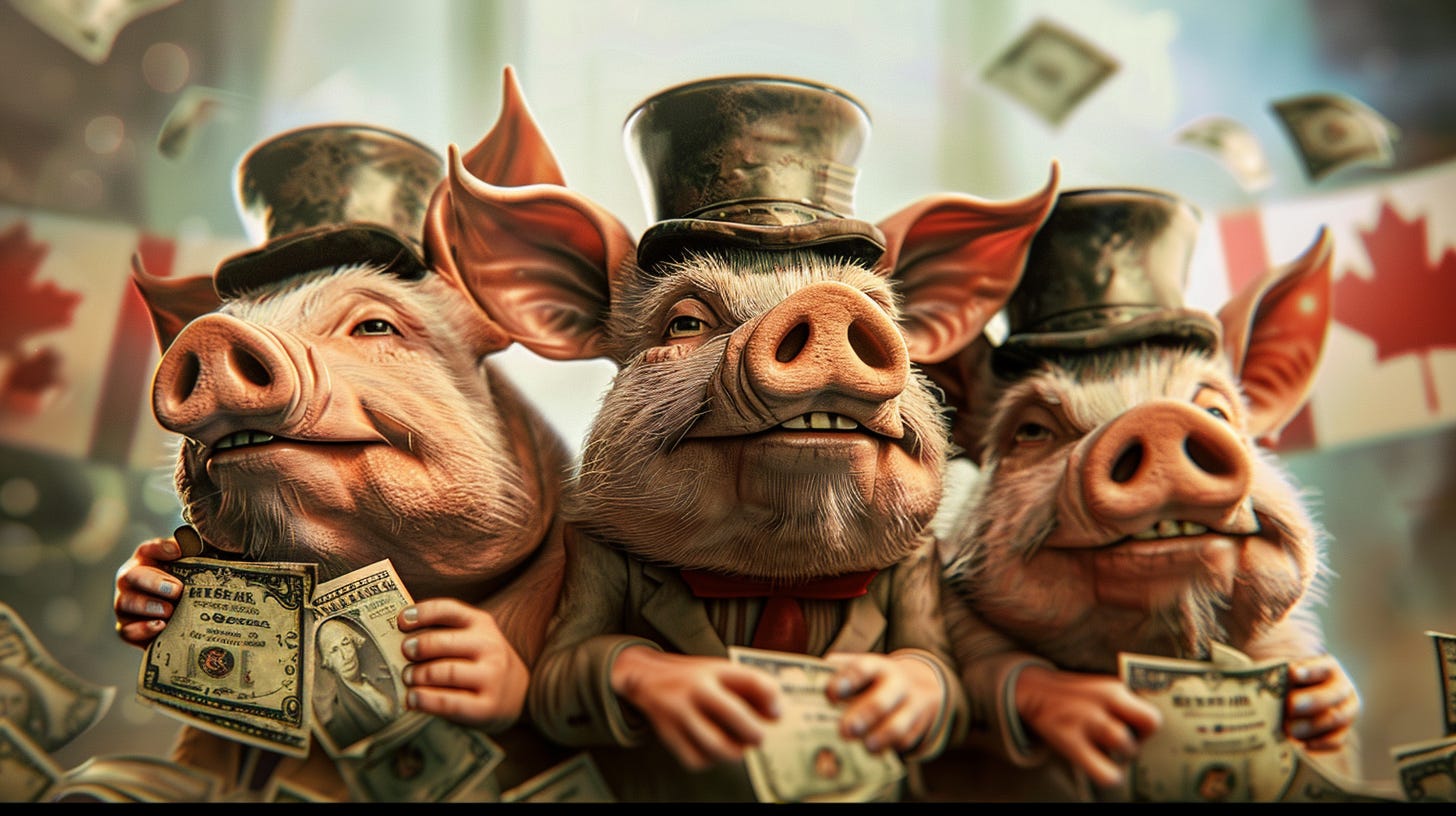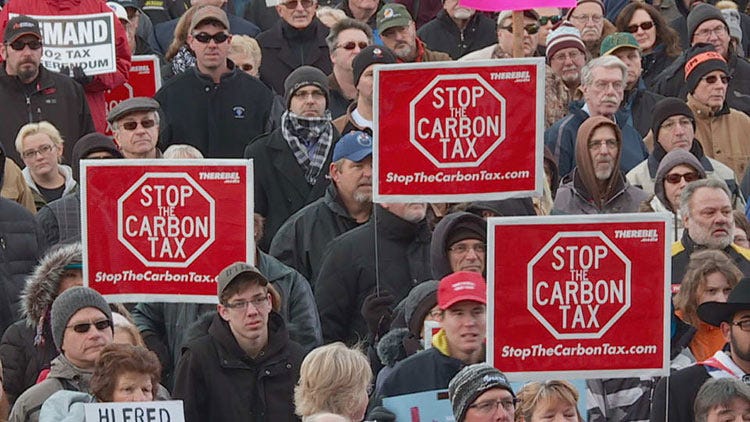Monopoly Nation: The Canadian Government’s Stranglehold on Competition
The LCBO—our beloved government-run liquor stores—have put down their bottles and picked up their picket signs. This strike is set to last at least two weeks, but there's talk of a "dry summer" as this could drag on for months. Why? In short, they're fighting tooth and nail to keep their monopoly rock-solid. They are demanding more full-time government jobs and zero competition.
What’s particularly frustrating is that even if supermarkets and convenience stores could sell booze, they still have to buy their stock from the LCBO. So, they get their cut regardless. In other words, they want to have their cake and eat it too.
Despite their anti-competitive stance, we've faced some pushback on our position, so we felt that it was worth addressing the two main points being raised:
Common Counter Argument #1: “But LCBO profits help fund our education and healthcare!”
Our Response: During the 2021/22 school year, Canadian public schools spent a total of $85.44 billion. For healthcare, Canada’s annual expenditure hovers around $350 billion. In comparison, the LCBO's reported net income for 2022/23 was $2.4 billion. Even if all LCBO profits were allocated to education and healthcare, they would cover only about 0.55% of the total costs.
Now, consider the 6,700 convenience stores across Canada. If these businesses took over the LCBO’s market share, it would translate to approximately $358,208.96 per store owner (though not all would receive an equal share). We’d much rather see consumers support Canadian business owners than failing government programs.
Common Counter Argument #2: “Think about the employees that would be out of a job!”
Our Response: Government employees should not be exempt from market dynamics. In the private sector, businesses that fail to compete do not receive government bailouts just to maintain employment. Similarly, if private companies were to expand and replace LCBO operations, they would also need to hire more staff. These jobs won’t simply disappear, they will shift to the private sector.
We all know that competition would be better for Canadians. We'd get better prices, improved delivery methods, more convenience, and probably some cool new products. This strike highlights exactly why we need to deregulate this market. But let’s get real: the government loves enforcing rules against monopolies in the private sector, with tons of regulations and penalties for anyone trying to control a market. Yet, when it comes to their operation, they believe the more control they have, the better.
As a libertarian in many ways, I’m for complete deregulation in all markets. So, let’s highlight some other monopolies the Canadian government has its stranglehold on.
Spoiler alert: none of them are doing us any favours.
Healthcare
Welcome to Canada, where healthcare is "free." But is it really? Our healthcare system is a government monopoly, riddled with long wait times and bureaucratic inefficiencies. According to a report by the Commonwealth Fund, Canada ranks last among 10 wealthy nations in healthcare outcomes and primary care. We’re talking about a system where people wait months for critical surgeries and treatments, while better solutions and innovation are constantly stifled by government control. And the cost? Well, it’s not free. Healthcare cost Canadians over $344 billion in 2023, with no signs of slowing down… If you’re interested in the math, it’s about $12,242 per taxpayer.
Despite having its own healthcare challenges, the United States has an average annual health insurance cost of $6,468 under the Affordable Care Act, plus approximately $5,900 in deductibles. However, Americans can write off 100% of their healthcare expenses.
While the average American pays $126 more annually for healthcare, an Ontarian earning $60,000 a year could save about $2,478 in taxes if they could write off the same amount Americans spend on healthcare. This system would also encourage people to maintain their health.
If Ontarians did not require hospital visits or prescriptions, they would only need to pay the $6,468 insurance cost. After writing this off, they would save an additional $1,385 in taxes, reducing their total healthcare cost to $5,083 annually—$7,159 less than what the average Canadian taxpayer currently spends.
In contrast, the Netherlands tops the list offering the best healthcare by employing a public-private hybrid model. Dutch citizens pay an average of $2,070 per year on healthcare, combining premiums and deductibles.
Education
Public education is another area where the government calls all the shots, and boy are they missing the target. While everyone gets an education, the quality varies wildly, and private or alternative educational models struggle to compete. Canada spends over $85 billion annually on public education, yet results are stagnating. Imagine the advancements we could see if schools had to compete for students! The Fraser Institute reports that private school students consistently outperform public school students in standardized tests. To make matters worse, they’ve crossed the line from education to harmful indoctrination questioning your parental fitness if you challenge their curriculum.
A state monopoly on education would still be a terrible idea, even if the school system wasn’t corrupted by ideologues. It turns education into a political battlefield, spending more time debating about what should be taught than actually teaching. While the state can require individuals to get an education, this doesn’t mean it needs to provide that education. We often discuss the importance of diversity, yet diversity of thought is impossible in state-run schools. Consider this perspective from John Stuart Mill, the most influential liberal philosopher of the nineteenth century:
“A general State education is a mere contrivance for moulding people to be exactly like one another: and as the mould in which it casts them is that which please the predominant power in the government, whether this be a monarch, a priesthood, an aristocracy, or the majority of the existing generation, in proportion as it is efficient and successful, it establishes a despotism over the mind, leading by natural tendency to one over the body.”
We need to innovate the education system by allowing our kids to attend schools that offer interest-based learning and a focus on STEM or other essential skills, as determined by their parents, free from ideological influence.
Broadcasting
The CBC is the poster child for government monopolies in broadcasting, which is funded by taxpayers to the tune of $1.4 billion annually. In addition to this absolute abuse of taxpayer dollars, hundreds of millions more are handed out to other mainstream news sources through programs like the Canadian Media Fund and the Action Plan for Official Languages. These heavily subsidized networks dominate the airwaves while private broadcasters fight for scraps.
To pour salt in the wound, the Trudeau government has limited our access to online news and further bolstered their media payouts through Bill C-18, they have control over what goes out through the streaming airwaves through Bill C-11 and may soon have complete control over online speech through Bill C-63. Additionally, the Canadian Radio-television and Telecommunications Commission (CRTC) imposes content quotas on broadcasters. Media organizations should respond to their viewership when deciding what to broadcast, not adhere to bureaucratic mandates.
This not only stifles competition and limits diverse viewpoints it censors Canadians and crushes legitimate free speech. In an era where content is king, Canadians deserve better than a government-mandated menu of mediocrity.
Banking and Finance
The banking sector is heavily regulated, with the government playing puppet master. This stifles competition and innovation. Canada’s big five banks—RBC, TD, Scotiabank, BMO, and CIBC—control about 90% of the market. With stringent regulations, new players struggle to enter the market.
Another issue in Canadian finance is Central banking. Much like anywhere else, this inevitably leads to centralized economic planning, which in turn causes mass inefficiencies and distortion of the free market. The Bank of Canada’s control over the nation's money supply and interest rates undermines the natural equilibrium established by free-market principles. This centralized power fuels inflation, erodes the purchasing power of hard-earned money, and contributes to boom-bust cycles that destabilize the economy.
We need more flexibility and fewer restrictions to allow new financial technologies and services to flourish. A report by the C.D. Howe Institute notes that deregulation would lead to a more dynamic and competitive banking environment.
Agriculture Supply Management
Canada's supply management system in agriculture is an overbearing regulatory approach that limits supply and keeps pricing artificially high. The government sets production quotas for dairy, poultry, and egg farmers based on their own demand projections. These quotas then limit the amount of product that can be produced annually. Prices for these products are also regulated and often set higher than international prices. A study by the C.D. Howe Institute found that Canadian consumers pay up to 60% more for dairy, poultry, and eggs compared to Americans. To prevent oversupply and maintain domestic prices, Canada imposes high tariffs on imported dairy, poultry, and egg products. These tariffs make it financially challenging for foreign producers to compete in the Canadian market.
Farmers and consumers alike suffer because of these outdated and restrictive practices. Deregulating this sector would lead to lower prices and more choices for consumers while boosting innovation in farming.
Lottery and Gambling
The government monopolizes lottery and gambling operations, controlling all the money flowing through these industries. In 2019, provincial lotteries and gambling brought in over $14 billion in revenue, yet the benefits to the public are questionable at best. Imagine the benefits of a competitive market where innovation and consumer choice could thrive. Private operators could offer better odds, more variety, and enhanced entertainment options.
I’m not a big gambler, but the excessive regulation only goes to serve the government. As extensively reported by Sam Cooper, international drug organizations launder money through our government-operated casinos. This creates an incentive for the government to overlook these activities, allowing narcos to profit from addiction, homelessness, and overdoses in Canada.
If casinos were privately owned, the government could still profit by seizing illegal funds. This would disincentivize casinos from facilitating money laundering and deter narco groups from operating on our soil.
Insurance
Government-run insurance programs create a lack of competition and choice in the market. In provinces like British Columbia, ICBC holds a monopoly on auto insurance, leading to high premiums and poor service. A 2020 report by the Insurance Bureau of Canada found that BC drivers pay the highest auto insurance premiums in Canada. While this isn’t prevalent in every province, they deserve more options and better services that only a competitive market can provide.
Energy
Provincial governments often control the energy sector, resulting in inefficiencies and higher costs for consumers. In Ontario, the government’s mishandling of the energy file has led to skyrocketing electricity prices. A report by the Fraser Institute found that Ontarians pay some of the highest electricity prices in North America. Of course, to make matters worse, our federal government has added a carbon tax to our already high energy costs to bend Canadians even further over the barrel.
Deregulating the energy market would lead to lower prices and more sustainable energy solutions, fostering innovation and competition.
Canada Pension Plan (CPP)
This one is a bit of a monopoly off-shoot, but it’s frustrating enough that we didn’t want to miss it. CPP is a mandatory retirement savings plan that leaves little room for personal choice and is one of the biggest rip-offs in history. The Fraser Institute found that the average rate of return for CPP contributors born after 1971 is a meagre 2.1%. That being said, this is not compounded annually like your installments, and the average Canadian would only get all of their money back if they lived to be around 82 years of age.
According to today’s numbers, the average Canadian will contribute $150,178 dollars during their lifetime. If you contributed the same amount to a personal savings account that compounded annually at the modest interest rate of just 3% rather than CPP, you would have nearly double that amount at $282,272 - and it would be guaranteed, you would get it on day one of retirement, and you could give the remainder to your kids when you pass away.
Now, if these contributions were invested wisely into an index fund with an average annual return of 8%, the investment could grow to $1,050,424 over 40 years (your years of contribution from 25 to 65).
CCP is just another example of the government controlling our money under the guise of protecting us. How about letting us decide how to save for our future?
Unshackle the Market
Ontario’s LCBO strike-driven ‘dry summer’ is more than an inconvenience—it’s a glaring example of the Canadian government’s infatuation with monopolies. We deserve better. By deregulating the markets and fostering competition, we can improve prices, convenience, and innovation. Cheers to a future where the free market reigns!










This article really opened my eyes to the amount of blatant fraud and corruption there is in this country. Made me angry reading it.
👏👏👏👏👏👏👏👏👏 excuse my French but fk..I wish we could just start over from scratch in this country. The facts we live under, as you describe, are far away from what most Cdns think we have. We put up with ‘way too much gvnmt crap to the point we’re basically all slaves to prop up now unionized bullshit bureaucracy